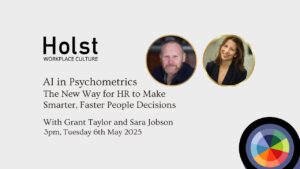Retain your talented people with succession planning based on robust job role benchmarking to define the personality traits and power skills needed for success.

Job role benchmarking allows HR teams and hiring managers to clearly define the needs of a role. From this starting point, they can identify people in their organisation who have the potential to meet these requirements and put in place a strategy to retain them.
Collaborative benchmarking should form the basis of succession planning. After all, if you don’t know what the role needs, how can you select someone for it? Without this job role ‘blueprint’, decisions are often based on gut-feel, ‘you-remind-me-of-me’ and previous experiences which may not be relevant to success in the new role. For example, an aspiring sales director may have a stellar sales record, but lack the empathy necessary to manage people fairly. A decision to promote such a person into a leadership role without taking their developmental needs into account is unlikely to be successful. In this instance, benchmarking for emotional and social intelligence equips the decision maker with the information they need on how to proceed.
In order to be effective, a succession planning strategy should aim to backfill junior roles before they become vacant. Deciding who will be the team leader when the incumbent moves on or sideways into a new role is crucial. There should be a rich pool of talent from which to select. Rather than resorting to auto-selecting the person who has been there longest, or having no one suitable to promote, grow your benchmark-based talent into the role well in advance.
Strengthen your talent pipeline at every level
Homegrown talent is cost effective and lower risk than external recruitment. If you have assessed against benchmarks to recruit good people who contribute to a positive workplace culture, you will have a strong talent base to develop. Not everyone will make a good leader or want to climb the leadership ladder. Consider who has leadership potential/aspiration, who might be better suited as a product/service expert and recognise, value and reward different career pathways. Leaders and experts should have a symbiotic relationship, they cannot achieve the organisation’s goals without each other.
Each individual should have a development plan which aims to improve skills and give the experience that will enable them to move into the next stage of their career. This could be developing the communication skills that will enable an individual to move sideways into a different department or into a people management role. It is important to develop people at every level in order to always have the possibility of selecting from within before looking externally. This commitment to continual career development will give confidence to your people and incentivise them to stay with you.
"Businesses must be flexible when it comes to the training needs of employees, providing support in the form of internal and external training courses, as well as clearly outlining progression paths to keep staff motivated and reaching for achievable goals. People are always looking to invest in themselves so if an organisation offers investment in its staff, through training, technology and other means, then they are more likely to join, as well as stay longer term. "
The importance of employee satisfaction in a flexible working world, CIPD People Management, 8 February 2023.
Plan for the replacement of your talented people
Planning for replacement is just as important as planning for promotion. In some cases it should come first. Having a strong talent pool that has been proactively developed enables you to make swift but not knee-jerk decisions. And of course, you may need to replace the replacement, etc. That’s why succession planning applies from the ground level up. Some roles can easily take three months to fill when recruiting externally. Instead, nurture from within and put a strong replacement in post in weeks if not days. This is where you gain measurable ROI on your development programme.
Strong succession planning boosts employee confidence
People work at their best when they trust their leadership. They need to believe their managers are fair, competent and have achieved their status through merit, not by ‘talking a good talk. Sadly, this is not always the case. Promoting on gut-feel, ‘you-remind-me-of-me’ and the wrong skill set can easily result in a costly promotion mistake. This is where benchmarking and assessments give decision makers the ability to select based on objective data and ask the right questions of their potential candidates.
A good promotion decision will help to retain the existing talent in your teams, thus strengthening the pipeline for the future. A poor promotion decision will lead to attrition, low morale and reduced productivity. Demonstrate your commitment to creating positive workplace culture through your approach to succession planning and the overall development of your people.
Work with Holst to identify, develop and retain your talented people
Of course no one wants to promote the wrong people, but it is easy for promotion pathways to become entrenched in outdated practice. The same mis-steps repeated time after time. The shakeup of the working world, the squeeze on margins and the risk of expensive avoidable workplace disputes, mean that organisations need to get their promotional decisions right.
We help organisations of every size and sector, from the start-up to the well-established, to create and optimise their succession planning strategies. Talk to our team of expert consultants and coaches to learn how we can do this for you.





